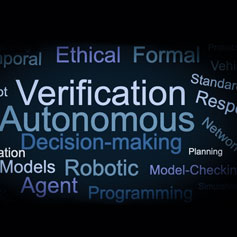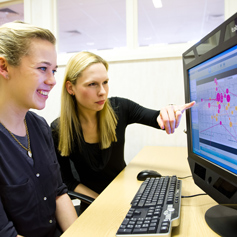
Software and e-infrastructure
The scientific world runs on software - from tiny scripts to automate scientific tasks, to the millions of lines of code behind international efforts such as the Large Hadron Collider.
We are building the next generation of tools and infrastructure to support best practice for industrial and academic software engineering.
Our aim is to cultivate and improve research software practices, to support world-class research.
Our facilities
We boast an incredible array of facilities, making our innovative software and e-infrastructure research possible.
Areas of expertise
Our researchers focus their work in the following specialist areas:
-
Autonomy and verification
The Autonomy and Verification Group focuses on autonomous systems and their development, verification, and analysis.
Read more
-
Human computer systems
Understanding how humans use and interact with computing systems is critical, and part of our core mission. We blend expertise in interface design with psychology theories, to build more intuitive computing systems.
Read more
-
Information management
We design, develop and build state of the art data and knowledge management systems -- spanning from formal underpinnings in knowledge representation and logic, to challenging interdisciplinary work.
Read more
-
Systems and software security
We develop state-of-the-art algorithms, methods and protocols to address security and privacy in networked and distributed system environments, and tools to build verifiable, trustworthy software systems.
Read more
Postgraduate research projects
Software and e-infrastructure projects
- Advising on the Use and Misuse of Collaborative Coding Workflows
- Automatic Detection and Repair of Software Vulnerabilities in Unmanned Aerial Vehicles
- Combining Concolic Testing with Machine Learning to Find Software Vulnerabilities in the Internet of Things
- Component-based Software Development.
- Design and Exploration of a Memristor-enabled FPGA Architecture
- Diabetes Tamagotchi's for Training Clinical Endocrinologists and Diabetologists
- Dynamic Resource Management for Intelligent Transportation System Applications
- Effective Teaching of Programming: A Detailed Investigation
- Exploiting Software Vulnerabilities at Large Scale
- Exploring the use of LLMs for Code Generation in Test-Only Development
- Finding Vulnerabilities in IoT Software using Fuzzing, Symbolic Execution and Abstract Interpretation
- Job and Task Scheduling and Resource Allocation on Parallel/Distributed systems including Cloud, Edge, Fog Computing
- Managing the data deluge for Big Data, Internet-of-Things and/or Industry 4.0 environments
- Scheduling, Resource Management and Decision Making for Cloud / Fog / Edge Computing
- Security and privacy in p2p electricity trading
- Using Program Synthesis for Program Repair in IoT Security
- Verification Based Model Extraction Attack and Defence for Deep Neural Networks
- Verifying Cyber-attacks in CUDA Deep Neural Networks for Self-Driving Cars
Lucas Cordeiro projects
- Application Level Verification of Solidity Smart Contracts
- Automated Repair of Deep Neural Networks
- Automatic Detection and Repair of Software Vulnerabilities in Unmanned Aerial Vehicles
- Combining Concolic Testing with Machine Learning to Find Software Vulnerabilities in the Internet of Things
- Designing Safe & Explainable Neural Models in NLP
- Exploiting Software Vulnerabilities at Large Scale
- Finding Vulnerabilities in IoT Software using Fuzzing, Symbolic Execution and Abstract Interpretation
- Hybrid Fuzzing Concurrent Software using Model Checking and Machine Learning
- Using Program Synthesis for Program Repair in IoT Security
- Verification Based Model Extraction Attack and Defence for Deep Neural Networks
- Verifying Cyber-attacks in CUDA Deep Neural Networks for Self-Driving Cars
Suzanne Embury projects
Gareth Henshall projects
Simon Harper projects
- Diabetes Tamagotchi's for Training Clinical Endocrinologists and Diabetologists
- Extending Behavioural Algorithmics as a Predictor of Type 1 Diabetes Blood Glucose Highs
- Generative Artificial Intelligence as a Personalised and Adaptive Bolus Advisor
- Models of Bio-Sensed Body Temperature and Environment as a Refinement of Type 1 Diabetes Blood Glucose Prediction Algorithmics
- OPTIMAL-EM: An AI-Driven Framework for Systematic Web Accessibility Evaluation
Dirk Koch projects
Kung-kiu Lau projects
Mustafa Mustafa projects
Paul Nutter projects
- A New Generation of Terahertz Emitters: Exploiting Electron Spin
- Effective Teaching of Programming: A Detailed Investigation
- Extending Behavioural Algorithmics as a Predictor of Type 1 Diabetes Blood Glucose Highs
- Models of Bio-Sensed Body Temperature and Environment as a Refinement of Type 1 Diabetes Blood Glucose Prediction Algorithmics
- Skyrmionic Devices for Neuromorphic Computing
Giles Reger projects
Rizos Sakellariou projects
- Dynamic Resource Management for Intelligent Transportation System Applications
- Finding a way through the Fog from the Edge to the Cloud
- Job and Task Scheduling and Resource Allocation on Parallel/Distributed systems including Cloud, Edge, Fog Computing
- Managing the data deluge for Big Data, Internet-of-Things and/or Industry 4.0 environments
- Problems in large graphs representing social networks
- Scheduling, Resource Management and Decision Making for Cloud / Fog / Edge Computing





